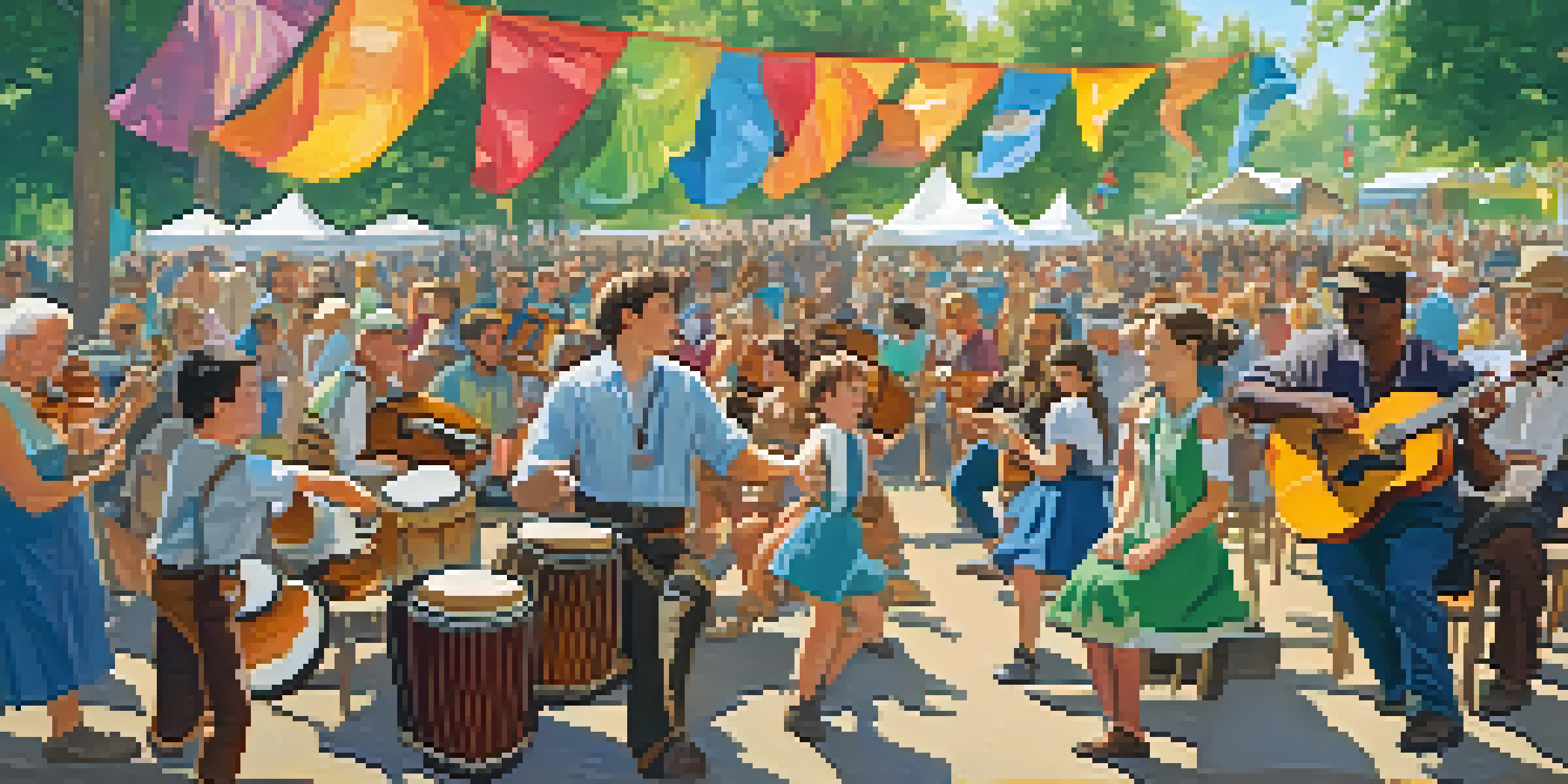The Role of Folk Music in Shaping Cultural Identities Today

Folk Music as a Reflection of Cultural Heritage
Folk music serves as a mirror reflecting the rich tapestry of cultural heritage. Each song tells a story, passing down traditions, values, and experiences from one generation to the next. For many communities, these melodies carry the weight of history, encapsulating the struggles and triumphs of their ancestors. This connection to the past fosters a sense of belonging and identity among individuals, making folk music a vital cultural artifact.
Folk music is the voice of the people, reflecting their struggles, dreams, and aspirations.
In many regions, folk music is intertwined with local customs and practices, enhancing its role in cultural identity. For instance, the traditional Irish jig not only entertains but also reinforces communal bonds during gatherings and celebrations. By participating in these musical traditions, individuals feel a deeper connection to their roots, allowing them to embrace their heritage with pride. This emotional resonance makes folk music an indispensable part of cultural preservation.
Moreover, folk music often evolves, incorporating contemporary influences while maintaining its core essence. This fusion allows new generations to engage with their cultural identities in a fresh and relevant way. As artists reinterpret traditional songs, they create a dialogue between the past and present, ensuring that folk music remains a dynamic part of cultural expression.
Folk Music as a Tool for Social Change
Beyond preserving cultural heritage, folk music can be a powerful tool for social change. Many folk artists use their platforms to address issues like inequality, injustice, and environmental concerns. For example, songs from the civil rights movement in the United States galvanized communities and inspired action, showcasing how music can unite people for a common cause.

This activist spirit continues today, with musicians from various backgrounds using traditional sounds to speak out against modern injustices. For instance, contemporary Indigenous artists often blend folk elements with modern genres to highlight the plight of their communities. By doing so, they not only educate wider audiences but also empower their own cultural identities.
Folk Music Reflects Cultural Heritage
Folk music serves as a vital cultural artifact, preserving traditions and fostering a sense of identity among communities.
The accessibility of folk music further enhances its role in social movements. With minimal instrumentation and a focus on lyrical storytelling, folk songs can be easily shared and adapted, making them relatable to diverse audiences. This grassroots quality allows folk music to resonate deeply, encouraging collective action and fostering a sense of solidarity among listeners.
The Globalization of Folk Music and Cultural Exchange
In our increasingly interconnected world, folk music transcends borders, facilitating cultural exchange and understanding. Artists from different countries often collaborate, blending their unique sounds to create something entirely new. This cross-pollination enriches the global music landscape, allowing folk traditions to evolve while still honoring their origins.
Music is the shorthand of emotion.
For example, the fusion of African rhythms with Western folk elements has led to innovative genres like Afro-folk, which celebrates both heritage and modernity. Such collaborations not only bring attention to underrepresented cultures but also invite audiences to appreciate the diversity of folk music worldwide. As people engage with these hybrid sounds, they develop a broader understanding of cultural identities.
However, this globalization also raises questions about cultural appropriation and authenticity. It is crucial for artists and audiences alike to navigate these conversations thoughtfully, ensuring that collaborations are respectful and rooted in mutual appreciation. By fostering genuine connections, folk music can serve as a bridge, promoting empathy and understanding across cultures.
Digital Platforms and the Revival of Folk Music
The rise of digital platforms has played a significant role in the revival of folk music, making it more accessible than ever. Streaming services, social media, and online communities allow folk artists to share their work with global audiences instantly. This newfound visibility not only helps preserve traditional forms but also encourages experimentation and innovation.
Young musicians are now using these platforms to reinterpret classic folk songs, blending them with modern sounds and themes. This blend attracts a younger audience, ensuring that folk music remains relevant in contemporary culture. For instance, artists like Mumford & Sons have popularized folk-infused pop, introducing traditional elements to listeners who might not otherwise engage with the genre.
Folk Music Drives Social Change
Through addressing social issues and injustices, folk music empowers communities and inspires collective action.
Moreover, online communities foster collaboration and support among artists and fans, creating a vibrant ecosystem for folk music. This interconnectedness enhances the sense of community, allowing individuals to share their stories and experiences through music. As a result, folk music continues to thrive, adapting to the times while retaining its core essence.
The Role of Folk Music in Personal Identity Formation
Folk music plays a significant role in personal identity formation, especially for individuals seeking to connect with their cultural roots. Listening to folk songs can evoke feelings of nostalgia, sparking memories of family gatherings, celebrations, and shared experiences. This emotional connection helps individuals forge their identities, allowing them to explore who they are in relation to their heritage.
Participating in folk music, whether through playing an instrument or singing, can also be a means of self-expression. It provides a creative outlet for individuals to convey their stories, emotions, and perspectives. This engagement fosters a sense of confidence and belonging, as individuals find their voices within the rich tapestry of their cultural traditions.
Furthermore, folk music often serves as a reminder of the importance of community and connection. In times of uncertainty or change, turning to familiar melodies can provide comfort and reassurance. This sense of belonging helps individuals navigate their personal journeys, reinforcing the idea that they are part of something larger—a shared cultural narrative.
Folk Music in Education and Cultural Awareness
Integrating folk music into educational settings can significantly enhance cultural awareness among students. By exploring traditional songs from various cultures, students gain insight into the values, beliefs, and histories of different communities. This exposure fosters empathy and respect, encouraging young people to appreciate diversity in a meaningful way.
Moreover, folk music can serve as a powerful tool for teaching language and storytelling. The lyrical nature of folk songs often reflects local dialects and expressions, providing students with a unique perspective on language learning. By engaging with these songs, learners can develop a deeper understanding of cultural nuances, enhancing their overall educational experience.
Digital Platforms Revive Folk Traditions
The rise of digital platforms has made folk music more accessible, allowing new artists to reinterpret and innovate within the genre.
Additionally, folk music can promote collaboration and teamwork in educational settings. Group activities centered around folk songs, such as singing or dancing, encourage students to work together, fostering a sense of community and camaraderie. This collaborative spirit reinforces the idea that music is a shared experience, uniting individuals across cultural divides.
The Future of Folk Music and Cultural Identity
As we look to the future, the role of folk music in shaping cultural identities is likely to evolve alongside societal changes. The blending of traditional and contemporary influences will continue to create new genres and expressions, allowing folk music to remain vibrant and relevant. This adaptability ensures that folk traditions can be preserved while also resonating with modern audiences.
Moreover, as issues of cultural representation and appropriation become more prominent, the conversation around folk music will evolve. Artists and communities will need to engage in discussions about authenticity and ownership, ensuring that the essence of folk music is respected and celebrated. This dialogue will be crucial in maintaining the integrity of cultural identities within the global music landscape.

Ultimately, folk music will continue to play a vital role in shaping cultural identities, providing a platform for self-expression, social change, and community building. As long as there are stories to tell and traditions to share, folk music will remain an essential thread in the fabric of cultural narratives, connecting people across generations and borders.